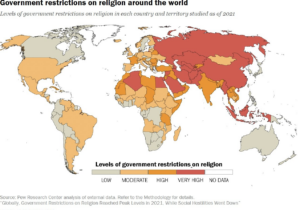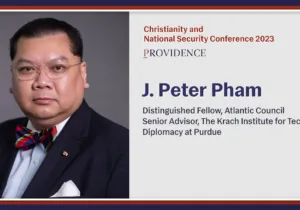While religion was formally abolished under the USSR, under Putin it has been repressed. Consequently, the United States Commission on International Religious Freedom identified Russia as one of the world’s worst violators of religious freedom.
In December 2021, just two months before the invasion of Ukraine, Russia’s supreme Court dissolved the non-governmental agency (NGO) Memorial, which is the oldest and most respected human rights organization in Russia and an outspoken supporter of religious freedom. Among other activities, the group was compiling a list of those imprisoned for alleged offenses related to religion. The dissolution of Memorial was seen as a warning to other activists, that they too could be prosecuted for speaking out against Putin’s government.
Under the Russian Constitution, though citizens are guaranteed religious freedom, authorities may suspend religious activity in the name of national security. Although the constitution specifically cites extremism as a cause for the suspension of religious freedom, it does not provide a robust definition of which activities could be considered “extremism.”
Additionally, Russia has strict laws on the registration of clergy and places of worship in addition to staunch prohibitions against missionary work. The term “missionary work” is broadly applied to “preaching, praying, disseminating religious materials, and answering questions about religion outside of officially designated sites.” Furthermore, the country has blasphemy laws and has the third-highest blasphemy prosecution rate in the world. Blasphemy is often used as a pretext to suppress the activities of religions other than the Russian Orthodox Church.
Russian law technically recognizes Christianity, Islam, Judaism, and Buddhism as the four “traditional” religions. But, only the Russian Orthodox Church is elevated to the role of representing the ideals and faith of Russia, passed down across untold generations . Officially acknowledging the Orthodox Church as being part of the country’s cultural and genetic heritage is significant because not only does it subordinate other religions, but it also subordinates Russia’s non-Slavic ethnic minorities.
Among the 200 ethnic groups living in the Russian Federation. Russian Slavs comprise 77.7% of the population while the remainder is comprised of smaller minorities like Tatars, Ukrainians, and Mari (Volga Finnic ethnic group in the republic of Mari El). Other ethnic groups in the Russian Far East and bordering on Central Asia include Khakas, Yakut, Chechens, Mongolic, and Turkic peoples. Many minority groups are adherents of religions not afforded the protection of “traditional” religions such as Christianity. About 63% of Russia’s population are Orthodox Christian, 7% are Muslim, and 26% identify as agnostic. Buddhists, Jews, other Christians, and animists each comprise about 1% or less of the population.
Religious groups and NGOs have reported ongoing abuses committed by the authorities. Members of groups designated “extremist”, “terrorist”, or “undesirable” have been subjected to investigation, detainment, imprisonment, torture, physical abuse, and/or seizure of property.
Among the groups suffering this type of repression are Islamic groups Hizb ut-Tahrir, Tablighi Jamaat, and followers of Muslim theologian Said Nursi. The Church of Scientology was closed on the grounds of posing a threat to national security. The Falun Gong spiritual movement was banned for extremism and terrorism. Multiple evangelical Protestant groups have been persecuted with Protestant Christians often being fined for “illegal missionary activity.”
Indigenous religions practiced by some small minorities, such as those in the Russian Far East, are not identified under the law as “traditional religions.” As such, they have suffered a great deal with even less recourse. Vandalism and desecration of sacred sites have been inflicted on the Mari religion and the indigenous Khakas religion (Siberian shamanism and Christianity) while a Yakut shaman who said she would exorcise Vladimir Putin was confined to a mental institution.
After the Russian invasion of and annexation of Crimea in 2014, religious groups previously legal in Ukraine were subjected to Russian law. Consequently, the Islamic Mejlis of the Crimean Tatars became a banned faith. Even the Ukrainian Orthodox Church (UOC) in Crimea is being persecuted and this has resulted in the confiscation of property belonging to the Cathedral of St. Vladimir and Olga. The Kremlin’s actions against Ukrainian Christians prompted the United States Congress to introduce the Ukraine Religious Freedom Support Act (H.R. 496).
The Russian high court ruled to ban Jehovah’s Witness in 2017, ushering in a period of harassment. To date, there have been more than 1,274 raids of homes belonging to Jehovah’s Witnesses with property confiscated and, in many instances, adherents being arrested. As of 2021, 52 Jehovah’s Witnesses were serving prison sentences. In June 2021, a Russian court sentenced four Jehovah’s Witnesses to 3-5 years in prison citing the Russian government felt that the presence of Jehovah’s Witness threatened the nation’s “civil peace and accord.”
Russia’s Old Believers, a Russian Orthodox denomination which split from the main church in 1666, have called on the Russian government to end its religious persecution of minorities, citing repression of non-Orthodox Christians in Tsarist Russia. The European Court of Human Rights ruled in 2022 that Russia’s ban of the Jehovah’s Witnesses faith was unlawful.
In 2020, the Russian government discussed religious legislation that would require all clergy who studied abroad to retrain in a Russian college where classes in Russian history and spirituality would be mandatory. This is particularly troubling for Russia’s Catholic, Muslim, Jewish, and Buddhist associations which have depended heavily on overseas educated clergy since the collapse of the USSR. The Catholic church reported that many of their foreign priests and nuns already faced difficulty obtaining work permits and that this new requirement for retraining would most likely force the closure of numerous dioceses.
Another form of religious discrimination has been seen in Putin’s call for conscripts which largely come from the ethnic and religious minority populations since the invasion of Ukraine began. Mongols from Buryatia, many of whom practice Shamanism, were particularly singled out for conscription. The regions that have suffered the highest casualties are Buryatia and the Republic of Dagestan, home to Turkic Muslims and Buryatia. Other predominantly minority regions suffering heavy casualties are the Krasnodar Krai, Bashkortostan, and Volgograd Oblast. As many as 40% of the casualties have been non-Slavic according to some accounts.
Donetsk and Luhansk, two regions of Ukraine with a high concentration of ethnic Russians, have had a long history of violence perpetrated against Christians and non-Moscow Patriarchate Orthodox communities. Now that these regions are occupied by Russia, religious repression is expected to increase.
Since the days of Tsarist Russia, through the Soviet era, and now, in the Russian Federation, under Vladimir Putin, Jews, Muslims, animists, Shamanists, and Christians who did not follow the Russian Orthodox faith have been oppressed. The fact that faith remains and that these believers have not given up the struggle to practice their religion is, in itself a miracle. The religious beliefs of the Russian people have outlived the Russian Empire and the USSR, and they will outlive Vladimir Putin.





